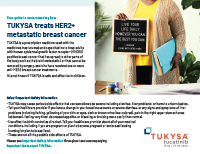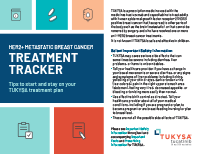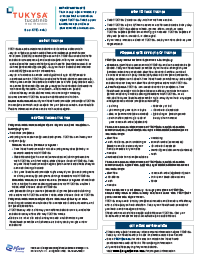INDICATION:
What is TUKYSA? TUKYSA is a prescription medicine used to treat adults with:
- a type of breast cancer called human epidermal growth factor receptor-2 (HER2) positive breast cancer. TUKYSA is used with the medicines trastuzumab and capecitabine, when your cancer has spread to other parts of the body such as the brain (metastatic), or cannot be removed by surgery, and you have received one or more anti-HER2 breast cancer treatments.
- a type of colorectal cancer called RAS wild-type HER2 positive colorectal cancer. TUKYSA is used with the medicine trastuzumab, when your cancer has spread to other parts of the body (metastatic), or cannot be removed by surgery, and you have received treatment with fluoropyrimidine-, oxaliplatin-, and irinotecan-based chemotherapy and it did not work or is no longer working. This use is approved based on a clinical study that measured how many patients had a tumor response and how long that response lasted. Studies are ongoing to confirm the benefit of TUKYSA for this use.
It is not known if TUKYSA is safe and effective in children.
What is TUKYSA? TUKYSA is a prescription medicine used with the medicines trastuzumab and capecitabine to treat adults with human epidermal growth factor receptor-2 (HER2) positive breast cancer that has spread to other parts of the body such as the brain (metastatic), or that cannot be removed by surgery, and who have received one or more anti-HER2 breast cancer treatments. It is not known if TUKYSA is safe and effective in children.
What is TUKYSA? TUKYSA is a prescription medicine used with the medicine trastuzumab to treat adults with RAS wild-type human epidermal growth factor receptor-2 (HER2) positive colorectal cancer that has spread to other parts of the body (metastatic), or cannot be removed by surgery, and who have received treatment with fluoropyrimidine-, oxaliplatin-, and irinotecan-based chemotherapy and it did not work or is no longer working. This use is approved based on a clinical study that measured how many patients had a tumor response and how long that response lasted. Studies are ongoing to confirm the benefit of TUKYSA for this use. It is not known if TUKYSA is safe and effective in children.

TUKYSA Resources and Support
Download the resources and support that are available to help you throughout treatment.

TUKYSA Brochure
Is your guide to treatment and what you can expect from TUKYSA, including possible side effects.

TUKYSA Treatment Tracker
Helps you keep track of your dosing plan and take notes about how you are feeling.
TUKYSA Treatment Tracker Calendar Pages
Use these additional calendar pages to help you stay on your dosing plan.

TUKYSA Important Facts
A brief summary of important information about TUKYSA.

Share Your Experience With TUKYSA
Provides information on how to share your story and personal experience with TUKYSA.
Frequently Asked Questions (FAQs)


Advocacy Groups
There are many local, community, and national advocacy organizations available to help support people
with breast cancer and their families. They each offer a range of services, including education and
counseling. There are also groups that offer legal services and employment advice.
Please note that the information that follows has been provided by each of the listed organizations.
Pfizer is not responsible for their content, and inclusion on this website is not intended as an
endorsement of the organization or the services offered.
Education
-
 BreastCancer.orgDedicated to providing the most reliable, complete, and up-to-date information about breast cancer.breastcancer.org
BreastCancer.orgDedicated to providing the most reliable, complete, and up-to-date information about breast cancer.breastcancer.org -
 FORCE (Facing Our Risk of Cancer Empowered)Provides support, education, and awareness to help those facing a range of hereditary and related cancers know their healthcare options and make informed decisions.facingourrisk.org
FORCE (Facing Our Risk of Cancer Empowered)Provides support, education, and awareness to help those facing a range of hereditary and related cancers know their healthcare options and make informed decisions.facingourrisk.org -
 Living Beyond Breast Cancer (LBBC)Delivers trusted medical and psychosocial information on early stage and metastatic breast cancer and connects individuals with a caring community of support.lbbc.org
Living Beyond Breast Cancer (LBBC)Delivers trusted medical and psychosocial information on early stage and metastatic breast cancer and connects individuals with a caring community of support.lbbc.org -
 Sisters Network® Inc. (SNI)The only national African American breast cancer survivorship organization in the United States and a leading voice in the fight against breast cancer in the African American community.sistersnetworkinc.org
Sisters Network® Inc. (SNI)The only national African American breast cancer survivorship organization in the United States and a leading voice in the fight against breast cancer in the African American community.sistersnetworkinc.org -
 Tigerlily FoundationA national breast cancer foundation that provides education, awareness, advocacy, and hands-on support to young women (15-45)—before, during, and after breast cancer--as well as endeavoring to end health disparities of age, stage, and color.tigerlilyfoundation.org
Tigerlily FoundationA national breast cancer foundation that provides education, awareness, advocacy, and hands-on support to young women (15-45)—before, during, and after breast cancer--as well as endeavoring to end health disparities of age, stage, and color.tigerlilyfoundation.org
-
 Young Survival Coalition (YSC)Strengthens the community, addresses the unique needs, amplifies the voice, and improves the quality of life of young adults affected by breast cancer.youngsurvival.org
Young Survival Coalition (YSC)Strengthens the community, addresses the unique needs, amplifies the voice, and improves the quality of life of young adults affected by breast cancer.youngsurvival.org
Support
-
 CANCERCare
CANCERCare
CancerCare provides free professional support services and information to help people manage the emotional, practical, and financial challenges of cancer.cancercare.org
-
 Cancer Support CommunityThe Cancer Support Community (CSC), including its Gilda’s Club affiliates, is a global non-profit network delivering cutting-edge research, providing free support services to patients and families—in person, over the phone, and online, and leading policy solutions.cancersupportcommunity.org
Cancer Support CommunityThe Cancer Support Community (CSC), including its Gilda’s Club affiliates, is a global non-profit network delivering cutting-edge research, providing free support services to patients and families—in person, over the phone, and online, and leading policy solutions.cancersupportcommunity.org
-
 Leslie’s WeekA stage 4 metastatic breast cancer nonprofit that provides vacations away from cancer for stage 4 breast cancer women and their families.lesliesweek.org
Leslie’s WeekA stage 4 metastatic breast cancer nonprofit that provides vacations away from cancer for stage 4 breast cancer women and their families.lesliesweek.org -
 SHAREEducates, supports, and empowers women affected by breast, ovarian, or metastatic breast cancer, with a special focus on medically underserved communities.sharecancersupport.org
SHAREEducates, supports, and empowers women affected by breast, ovarian, or metastatic breast cancer, with a special focus on medically underserved communities.sharecancersupport.org -
 SharsheretSharsheret, Hebrew for chain, is the only national organization supporting Jewish women and families, and those of all backgrounds, who are facing breast and ovarian cancer or are at an increased genetic risk.sharsheret.org
SharsheretSharsheret, Hebrew for chain, is the only national organization supporting Jewish women and families, and those of all backgrounds, who are facing breast and ovarian cancer or are at an increased genetic risk.sharsheret.org
-
 Susan G. KomenSusan G. Komen’s mission is to save lives by meeting the most critical needs in our communities and investing in breakthrough research to prevent and cure breast cancer.komen.org
Susan G. KomenSusan G. Komen’s mission is to save lives by meeting the most critical needs in our communities and investing in breakthrough research to prevent and cure breast cancer.komen.org -
 Unite for HERUnite for HER’s mission is to enrich the health and well-being of those diagnosed with breast and ovarian cancers by funding and delivering Integrative and Supportive Therapies that help empower and restore your body, mind, and soul. Our vision is that every one of our members will feel the support of a loving community, and will have access to comprehensive education, services, and tools that enrich their health and well-being.uniteforher.org
Unite for HERUnite for HER’s mission is to enrich the health and well-being of those diagnosed with breast and ovarian cancers by funding and delivering Integrative and Supportive Therapies that help empower and restore your body, mind, and soul. Our vision is that every one of our members will feel the support of a loving community, and will have access to comprehensive education, services, and tools that enrich their health and well-being.uniteforher.org
Research
-
 BreastCancerTrials.org
BreastCancerTrials.org
A nonprofit service that encourages individuals affected by breast cancer to consider clinical trials as a routine option for care, by helping people interested in studies to learn about and find trials that are right for them.breastcancertrials.org
-
 Dr. Susan Love FoundationPerforms and facilitates innovative and collaborative research while translating science to engage the public as informed partners.drsusanloveresearch.org
Dr. Susan Love FoundationPerforms and facilitates innovative and collaborative research while translating science to engage the public as informed partners.drsusanloveresearch.org
-
 METAvivorDedicated to advancing research for those diagnosed with metastatic stage 4 breast cancer. The organization funds vital research to help improve the longevity and quality of life for MBC patients. METAvivor also provides support for those living with MBC as well as education, advocacy, and awareness.metavivor.org
METAvivorDedicated to advancing research for those diagnosed with metastatic stage 4 breast cancer. The organization funds vital research to help improve the longevity and quality of life for MBC patients. METAvivor also provides support for those living with MBC as well as education, advocacy, and awareness.metavivor.org
Important Safety Information

What are the possible side effects of TUKYSA?
TUKYSA may cause serious side effects, including:
- Diarrhea (watery, loose, or frequent stools) is common and can sometimes be severe. Tell your healthcare provider if you have a change in your bowel movements or severe diarrhea. Severe diarrhea can cause a loss of too much body fluids (dehydration), low blood pressure, kidney problems, and death. Your healthcare provider may prescribe medicines to treat your diarrhea during treatment with TUKYSA.
- Liver Problems, including severe cases. Your healthcare provider will test your blood to check your liver function before starting and every 3 weeks during treatment with TUKYSA, or as needed. Tell your healthcare provider right away if you have any signs and symptoms of liver problems including itching, yellowing of your skin or eyes, dark or brown urine (tea-colored), pain in the right upper stomach area (abdomen), feeling very tired, decreased appetite, or bleeding or bruising more easily than normal.
The most common side effects of TUKYSA in combination with trastuzumab and capecitabine in adults with HER2-positive breast cancer include:
- diarrhea
- rash, redness, pain, swelling, or blisters on the palms of your hands or soles of your feet
- nausea
- increased liver function blood tests
- vomiting
- mouth sores (stomatitis)
- decreased appetite
- a low number of red blood cells (anemia)
- rash
The most common side effects of TUKYSA in combination with trastuzumab in adults with RAS wild-type HER2-positive colorectal cancer include:
- diarrhea
- tiredness
- rash
- nausea
- stomach-area (abdomen) pain
- infusion-related reactions
- fever
TUKYSA may cause fertility problems in males and females, which may affect the ability to have children. Talk to your healthcare provider if you have concerns about fertility.
These are not all the possible side effects of TUKYSA. Discuss side effects with your healthcare provider. You may report side effects to FDA at 1-800-FDA-1088 or www.fda.gov/Safety/MedWatch.
These are not all the possible side effects of TUKYSA. Discuss side effects with your healthcare provider. You may report negative side effects to the FDA at 1-800-FDA-1088 or www.fda.gov/Safety/MedWatch.

What should I tell my healthcare provider before taking TUKYSA?
Before taking TUKYSA, tell your healthcare provider about all of your medical conditions, including if you:
- have liver problems.
-
are pregnant or plan to become pregnant. TUKYSA can harm your unborn
baby.
Females who can become pregnant: Your healthcare provider will do a pregnancy test before you start taking TUKYSA. Use effective birth control (contraception) during TUKYSA treatment and for 1 week after the last dose of TUKYSA. Tell your healthcare provider right away if you become pregnant or think you may be pregnant during treatment with TUKYSA.
Males with a female partner who can become pregnant: Use effective birth control during TUKYSA treatment and for 1 week after the last dose of TUKYSA. - are breastfeeding (nursing) or plan to breastfeed. Do not breastfeed during treatment with TUKYSA and for 1 week after the last dose of TUKYSA.
Tell your healthcare provider about all the medicines you take, including prescription and over-the-counter medicines, vitamins, and herbal supplements. TUKYSA may affect the way your other medicines work, and other medicines may affect the way TUKYSA works. Keep a list of all the medicines you take and show it to your healthcare provider and pharmacist every time you get a new medicine.
REF-8290_FINAL_01/23
Indication
Indication

What is TUKYSA?
TUKYSA is a prescription medicine used with the medicine trastuzumab to treat adults with RAS wild-type human epidermal growth factor receptor-2 (HER2) positive colorectal cancer that has spread to other parts of the body (metastatic), or cannot be removed by surgery, and who have received treatment with fluoropyrimidine-, oxaliplatin-, and irinotecan-based chemotherapy and it did not work or is no longer working.
This use is approved based on a clinical study that measured how many patients had a tumor response and how long that response lasted. Studies are ongoing to confirm the benefit of TUKYSA for this use.
It is not known if TUKYSA is safe and effective in children.
Please see Important Facts about TUKYSA.
TUKYSA is a prescription medicine used to treat adults with:
- a type of breast cancer called human epidermal growth factor receptor-2 (HER2) positive breast cancer. TUKYSA is used with the medicines trastuzumab and capecitabine, when your cancer has spread to other parts of the body such as the brain (metastatic), or cannot be removed by surgery, and you have received one or more anti-HER2 breast cancer treatments.
-
a type of colorectal cancer called RAS wild-type HER2
positive colorectal cancer. TUKYSA is used with the medicine
trastuzumab, when your cancer has spread to other parts of the
body (metastatic), or cannot be removed by surgery,
and you have received treatment with
fluoropyrimidine-, oxaliplatin-, and irinotecan-based
chemotherapy and it did not work or is no longer working.
This use is approved based on a clinical study that measured how many patients had a tumor response and how long that response lasted. Studies are ongoing to confirm the benefit of TUKYSA for this use.
It is not known if TUKYSA is safe and effective in children.
Please see Important Facts about TUKYSA.
TUKYSA is a prescription medicine used with the medicines trastuzumab and capecitabine to treat adults with human epidermal growth factor receptor-2 (HER2) positive breast cancer that has spread to other parts of the body such as the brain (metastatic), or that cannot be removed by surgery, and who have received one or more anti-HER2 breast cancer treatments.
It is not known if TUKYSA is safe and effective in children.
Please see Important Facts about TUKYSA.
Important Safety Information
Important Safety Information and Indication
What are the possible side effects of TUKYSA?
TUKYSA may cause serious side effects, including:
- Diarrhea (watery, loose, or frequent stools) is common and can sometimes be severe. Tell your healthcare provider if you have a change in your bowel movements or severe diarrhea. Severe diarrhea can cause a loss of too much body fluids (dehydration), low blood pressure, kidney problems, and death. Your healthcare provider may prescribe medicines to treat your diarrhea during treatment with TUKYSA.
- Liver Problems, including severe cases. Your healthcare provider will test your blood to check your liver function before starting and every 3 weeks during treatment with TUKYSA, or as needed. Tell your healthcare provider right away if you have any signs and symptoms of liver problems including itching, yellowing of the skin or eyes, dark or brown urine (tea-colored), pain or discomfort in the right upper stomach area (abdomen), feeling very tired, decreased appetite, or bleeding or bruising more easily than normal.
What is TUKYSA?
TUKYSA is a prescription medicine used to treat adults with:
- a type of breast cancer called human epidermal growth factor receptor-2 (HER2) positive breast cancer. TUKYSA is used with the medicines trastuzumab and capecitabine, when your cancer has spread to other parts of the body such as the brain (metastatic), or cannot be removed by surgery, and you have received one or more anti-HER2 breast cancer treatments.
-
a type of colorectal cancer called RAS wild-type HER2
positive colorectal cancer. TUKYSA is used with the medicine
trastuzumab, when your cancer has spread to other parts of the
body (metastatic), or cannot be removed by surgery,
and you have received treatment with
fluoropyrimidine-, oxaliplatin-, and irinotecan-based
chemotherapy and it did not work or is no longer working.
This use is approved based on a clinical study that measured how many patients had a tumor response and how long that response lasted. Studies are ongoing to confirm the benefit of TUKYSA for this use.
It is not known if TUKYSA is safe and effective in children.
What is TUKYSA? TUKYSA is a prescription medicine used with the medicines trastuzumab and capecitabine to treat adults with human epidermal growth factor receptor-2 (HER2) positive breast cancer that has spread to other parts of the body such as the brain (metastatic), or that cannot be removed by surgery, and who have received one or more anti-HER2 breast cancer treatments. It is not known if TUKYSA is safe and effective in children.
What is TUKYSA? TUKYSA is a prescription medicine used with the medicine trastuzumab to treat adults with RAS wild-type human epidermal growth factor receptor-2 (HER2) positive colorectal cancer that has spread to other parts of the body (metastatic), or cannot be removed by surgery, and who have received treatment with fluoropyrimidine-, oxaliplatin-, and irinotecan-based chemotherapy and it did not work or is no longer working. This use is approved based on a clinical study that measured how many patients had a tumor response and how long that response lasted. Studies are ongoing to confirm the benefit of TUKYSA for this use. It is not known if TUKYSA is safe and effective in children.

What are the possible side effects of TUKYSA?
TUKYSA may cause serious side effects, including:
- Diarrhea (watery, loose, or frequent stools) is common and can sometimes be severe. Tell your healthcare provider if you have a change in your bowel movements or severe diarrhea. Severe diarrhea can cause a loss of too much body fluids (dehydration), low blood pressure, kidney problems, and death. Your healthcare provider may prescribe medicines to treat your diarrhea during treatment with TUKYSA.
- Liver Problems, including severe cases. Your healthcare provider will test your blood to check your liver function before starting and every 3 weeks during treatment with TUKYSA, or as needed. Tell your healthcare provider right away if you have any signs and symptoms of liver problems including itching, yellowing of your skin or eyes, dark or brown urine (tea-colored), pain in the right upper stomach area (abdomen), feeling very tired, decreased appetite, or bleeding or bruising more easily than normal.
The most common side effects of TUKYSA in combination with trastuzumab and capecitabine in adults with HER2-positive breast cancer include:
- diarrhea
- rash, redness, pain, swelling, or blisters on the palms of your hands or soles of your feet
- nausea
- increased liver function blood tests
- vomiting
- mouth sores (stomatitis)
- decreased appetite
- a low number of red blood cells (anemia)
- rash
The most common side effects of TUKYSA in combination with trastuzumab in adults with RAS wild-type HER2-positive colorectal cancer include:
- diarrhea
- tiredness
- rash
- nausea
- stomach-area (abdomen) pain
- infusion-related reactions
- fever
Your healthcare provider may change your dose of TUKYSA, temporarily stop, or permanently stop treatment with TUKYSA if you have certain side effects.
TUKYSA may cause fertility problems in males and females, which may affect the ability to have children. Talk to your healthcare provider if you have concerns about fertility.
These are not all the possible side effects of TUKYSA. Discuss side effects with your healthcare provider. You may report side effects to FDA at 1-800-FDA-1088 or www.fda.gov/Safety/MedWatch.
These are not all the possible side effects of TUKYSA. Discuss side effects with your healthcare provider. You may report negative side effects to the FDA at 1-800-FDA-1088 or www.fda.gov/Safety/MedWatch.

What should I tell my healthcare provider before taking TUKYSA?
Before taking TUKYSA, tell your healthcare provider about all of your medical conditions, including if you:
- have liver problems.
-
are pregnant or plan to become pregnant. TUKYSA can harm your
unborn baby.
Females who can become pregnant: Your healthcare provider will do a pregnancy test before you start taking TUKYSA. Use effective birth control (contraception) during TUKYSA treatment and for 1 week after the last dose of TUKYSA. Tell your healthcare provider right away if you become pregnant or think you may be pregnant during treatment with TUKYSA.
Males with a female partner who can become pregnant:
Males with a female partner who can get pregnant: Use effective birth control during TUKYSA treatment and for 1 week after the last dose of TUKYSA. - are breastfeeding (nursing) or plan to breastfeed. Do not breastfeed during treatment with TUKYSA and for 1 week after the last dose of TUKYSA.
Tell your healthcare provider about all the medicines you take, including prescription and over-the-counter medicines, vitamins, and herbal supplements. TUKYSA may affect the way your other medicines work, and other medicines may affect the way TUKYSA works. Keep a list of all the medicines you take and show it to your healthcare provider and pharmacist every time you get a new medicine.
REF-8273_FINAL_01/23

Indication
What is TUKYSA?
TUKYSA is a prescription medicine used to treat adults with:
- a type of breast cancer called human epidermal growth factor receptor-2 (HER2) positive breast cancer. TUKYSA is used with the medicines trastuzumab and capecitabine, when your cancer has spread to other parts of the body such as the brain (metastatic), or cannot be removed by surgery, and you have received one or more anti-HER2 breast cancer treatments.
-
a type of colorectal cancer called RAS wild-type HER2
positive colorectal cancer. TUKYSA is used with the medicine
trastuzumab, when your cancer has spread to other parts of
the body (metastatic), or cannot be removed by surgery,
and you have received treatment with
fluoropyrimidine-, oxaliplatin-, and irinotecan-based
chemotherapy and it did not work or is no longer working.
This use is approved based on a clinical study that measured how many patients had a tumor response and how long that response lasted. Studies are ongoing to confirm the benefit of TUKYSA for this use.
It is not known if TUKYSA is safe and effective in children.
Please see Important Facts about TUKYSA.

What is TUKYSA?
TUKYSA is a prescription medicine used with the medicines trastuzumab and capecitabine to treat adults with human epidermal growth factor receptor-2 (HER2) positive breast cancer that has spread to other parts of the body such as the brain (metastatic), or that cannot be removed by surgery, and who have received one or more anti-HER2 breast cancer treatments.
It is not known if TUKYSA is safe and effective in children.
Please see Important Facts about TUKYSA.

What is TUKYSA?
TUKYSA is a prescription medicine used with the medicine trastuzumab to treat adults with RAS wild-type human epidermal growth factor receptor-2 (HER2) positive colorectal cancer that has spread to other parts of the body (metastatic), or cannot be removed by surgery, and who have received treatment with fluoropyrimidine-, oxaliplatin-, and irinotecan-based chemotherapy and it did not work or is no longer working.
This use is approved based on a clinical study that measured how many patients had a tumor response and how long that response lasted. Studies are ongoing to confirm the benefit of TUKYSA for this use.
It is not known if TUKYSA is safe and effective in children.
Please see Important Facts about TUKYSA.
